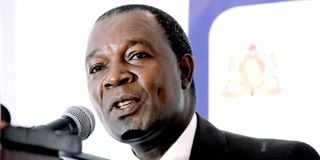Premium
Will Treasury CS nominee Njuguna Ndung’u have the Midas touch?

Treasury CS nominee Njuguna Ndung’u.
President William Ruto yesterday nominated former Central Bank of Kenya (CBK) Governor Njuguna Ndung’u as the new Cabinet Secretary for the National Treasury and Planning, marking a major comeback for the economist, who enjoyed mixed fortunes at the apex bank.
Prof Ndung’u will make the big time should he be approved by Parliament. He is understood to be among the key men in Dr Ruto’s inner circle who helped craft his manifesto ahead of his stab at the presidency.
Prof Ndung’u replaces Ukur Yatani who was appointed in January 2020 after serving from July 2019 in an acting capacity.
The experienced economist exited the CBK in March 2015 after serving the maximum eight years at the helm, having been appointed for his first term in March 2007 by former President Mwai Kibaki.
He was appointed as executive director of pan-African economic research think-tank African Economic Research Consortium in September 2018.
Prof Ndung’u will be familiar with the economic turmoil Kenya finds itself in after facing one of the worst economic crises in Kenya’s history barely a year into his first term at the helm of the CBK following the violence that followed the 2007 polls and brought the economy to a near standstill, with the gross domestic product (GDP) growth dropping to just 1.5 per cent in 2008, the lowest since 2002 when it grew by just 0.5 per cent.
His immediate task was to steer the economy—which had grown four years in a row since the election of Mr Kibaki—hitting a high of 6.9 per cent in 2007, back on track amid massive internal displacement of people and job losses following closure of businesses.
Under his stewardship, the economy steadily trudged back on track to grow 2.7 per cent in 2009, before growing by a record 8.1 per cent in the following year.
Banks also thrived under Prof Ndung’u’s tenure, with the government adopting policies that supported the growth of the sector’s assets and profits each year.
He also oversaw growth in capital markets, with new firms listing at the Nairobi Securities Exchange (NSE) and automated trading in government bonds introduced at the NSE in 2009.
Having been appointed in the same month Safaricom launched mobile money transfer service M-Pesa, he backed innovation in the financial services sector, helping put Kenya on the global map as a leader in mobile money.
Prof Ndung’u also oversaw the adoption of agency banking in Kenya in 2010, helping expand the reach of financial services to more Kenyans.
But his tenure was also marred by low points, having survived an ouster by Members of Parliament over the sharp weakening of the shilling in 2011 that stoked inflation, which remained high throughout 2011 and 2012. It hit a new high of 19.72 per cent in November 2011 as households struggled to put food on the table amid a sharp rise in the cost of basic commodities. The troubles even saw him ranked at the bottom of African central bank governors in 2011 by a Reuters poll.
Prof Ndung’u inherits a treasury that is broke, piling spending needs, a high cost of living and a mountain of debt amid tight timelines to meet conditions set by the International Monetary Fund as part of its loan deal with Kenya. The debt burden hit Sh8.6 trillion in June, accounting for about 68 per cent of the GDP even as the debt is tipped to hit Sh9.8 trillion by June next year.
This will be just shy of the Sh10 trillion debt ceiling that was set by MPs this year, which will force the exchequer to become creative in how to fund the budget without worsening the debt load.
His tenure will also begin amid increasing reliance by Kenyans on subsidies to lower the prices of commodities to ease the high cost of living. Inflation hit 8.53 per cent in August driven by high food, electricity and fuel costs, which was the highest rate in five years since it clocked 9.27 per cent in June 2017.
The government has been subsidising fuel, electricity, maize flour and fertiliser prices to reduce prices, but the Ruto administration has committed to end the subsidies to ease the burden on the exchequer.





